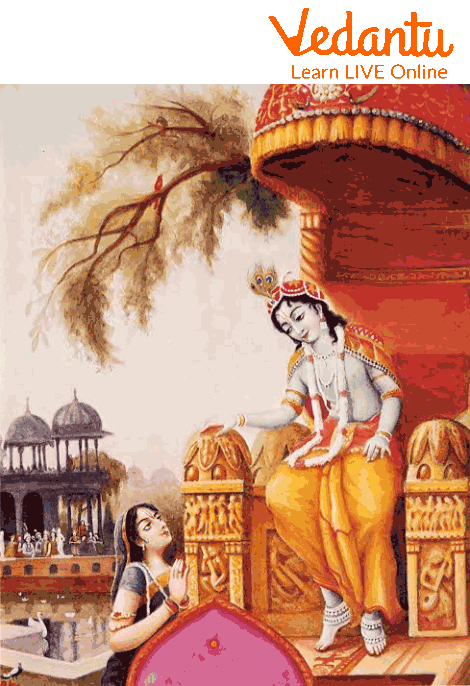The Story of Karna’s Promise in English for Kids

Introduction to the Story of Karna’s Promise
The Mahabharata is one of the most recognised texts in Indian culture. Karna, in particular, is a fascinating character. He is known for his generosity and commitment to duty or “dharma”. In this story, we shall learn about Karna’s backstory, and the influences that made him an essential character in the epic.
Summary of the Story of Karna’s Promise in English
How Karna was Born
A monarch named Shurasena was said to have had a lovely little daughter named Kunti. Durvasa, a rishi (sage), spent considerable time at the king's court as a guest. Kunti was responsible for making sure Durvasa was comfortable throughout his stay. Durvasa thanked her and blessed her as he was departing, having been pleased with his stay and her attentive assistance, and he told her that if she ever desired it, she might summon any deity to give her a child.
Teenage Kunti was inquisitive and questioned whether the blessing would work. One morning, she prayed to Surya, the sun god. The blessing worked, and she gave birth to her first son, who arrived with a golden radiance and was decked out in jewellery and a breastplate. Kunti was perplexed and humiliated, worrying about social justice as an unmarried mother. In that time period, unmarried mothers were seen as unchaste and outcasts. Fearful of the humiliation, she placed the newborn infant in a cushioned basket and let it float free in the nearby Ashvanadi River.
How Karna was Raised
The basket floated into Bengal. Radha, the wife of a charioteer, discovers it there and brings the infant Karna to her husband, Adhiratha. They immediately adopt him and give him the name Vasusena. They love him, and they treat him like their own son. Karna’s step-father, Adhiratha, was the charioteer of King Dridirashtra, the father of the Kauravas and the husband of Gandhari, in Suryaputra Karna’s story. He was also known as sutaputra - the son of a charioteer.
Karna and Arjuna had a long and bitter rivalry as he grew older. They each vowed to kill the other. Before the war broke out in Kurukshetra, Kunti visited Karna to beseech him to take mercy on the Pandavas.
Karna’s Promise
By this point, Karna was aware of the reality of his birth. He also predicted that Kunti would want to have a conversation with him. As a result, when Kunti approached Karna, Karna's greeting to her was both sincere and direct. He introduced himself as the son of Radha and Adhiratha and asked Kunti how he could be of service.
Kunti, who was moved to tears, informed Karna that he was her son of Kunti, not of Radha. He was subsequently invited to depart from Duryodhana and join the Pandavas. Karna, due to his loyalty, refused. Kunti then requested Karna not to defeat any Pandavas in the Kurukshetra battle. Karna said it was his dharmic duty to fight to the his best ability for the Kauravas.

Picture of Krishna Meeting Kunti
Moral of the Story of Karna’s Promise
Loyalty is an important virtue which Karna displays. He is loyal to his foster parents and keeps his promise to his biological mother. Loyalty is important because individuals are more open and transparent when they know the other person is loyal. Loyalty builds relationships.
Note to Parents
Children may need to comprehend this story on the first reading fully. As a result, parents must be careful to fully explain each part of the story to their children. Children typically prefer stories that have a distinct hero and villain. Parents should attempt to connect the character’s history to their behaviour in the other chapters. They should stress the significance of positive traits in a person, such as loyalty and kindness.
Conclusion
After his conversation with Kunti, Karna could not say no to his mother. Karna assured Kunti that her plea would not be in vain. Even though he could defeat and kill them, Karna stated he wouldn't use force to kill all the Pandavas. He promised her that she would have at least five sons. Kunti would be with Karna, without Arjuna, or with Arjuna if Karna were killed.


FAQs on The Story of Karna’s Promise in English for Kids
1. What is an instance of Karna’s generosity?
Lord Surya had decided to bestow his son with invincible Kavach and Kundal (armour and earrings, respectively). Before the war, Lord Indra disguised himself as a poor Brahmin and asked Karna for his invincible kavach and kundals. Given Karna’s generous nature, he gave the Brahmin his invincible armour and earrings without a second thought.
2. What was Krishna’s opinion about Karna? (Krishna about Karna)
Krishna, surprisingly, was rather fond of Karna. Lord Krishna wept at Karna’s death because Karna was kind, loyal and understood his dharma but was just unlucky. Krishna used to refer to Karna as the unblemished one because Karna didn’t commit any sins.
3. Did the Pandavas ever find out that Karna was their half-brother?
Yes. During the Kurukshetra war, Karna and Arjuna had an intense duel. Ultimately, Karna was killed by Arjuna. Afterwards, Kunti told the Pandavas that Karna was their half-brother, and all the Pandavas mourned his death.




